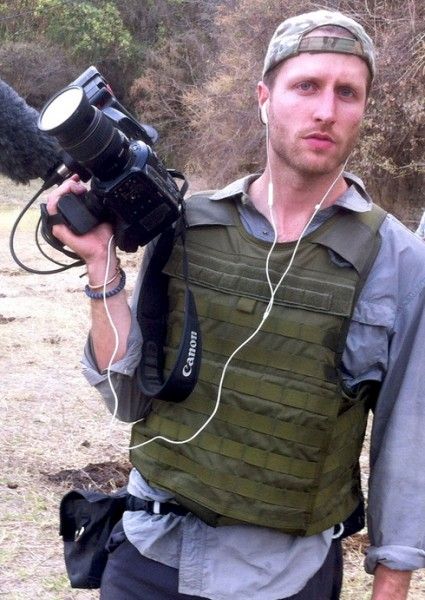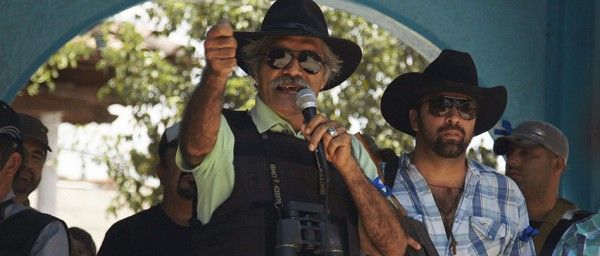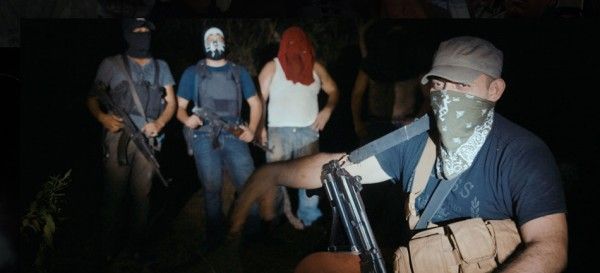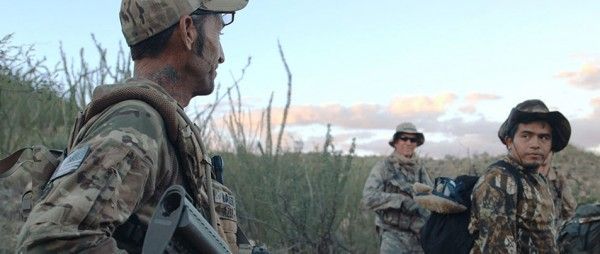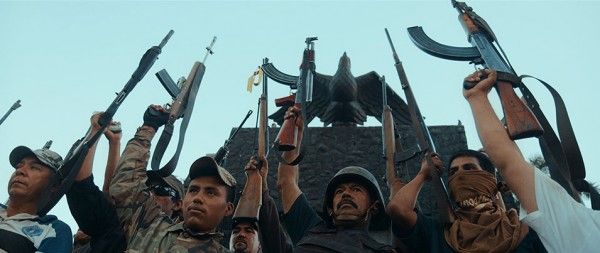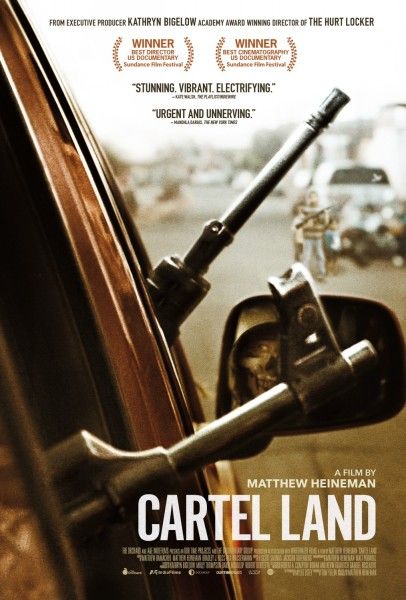One of the best films I saw at the Sundance Film Festival this past January was director Matthew Heineman’s chilling documentary Cartel Land. Executive produced by Kathryn Bigelow, the film chronicles the battle against Mexican drug cartels by two vigilante groups on opposite sides of the border: the Arizona Border Recon in the U.S., and a rebel uprising group in the Mexican state of Michoacán. What begins as a seemingly simple story of two groups ultimately fighting for the same thing slowly turns into a deeply unsettling look at the corruption that permeates throughout Mexico, and how the process of rebellion breeds its own kind of corruption and power struggles.
Cartel Land is important because it not only illuminates a devastatingly serious issue, but it also touches on larger truths about the human race, the process of change, and the influence that power can have on individuals. It’s not just the best documentary of the year so far, it’s one of the best films of the year so far.
With Cartel Land opening in limited release this Friday, July 3rd, I recently got the chance to hop on the phone with Heineman and discuss his film. We spoke about the Sundance experience, how the topic of Cartel Land came to him in the first place, the most frightening moment during filming, the editing process, and more. Check out the full interview below, and click here to read my review.
What was the experience leading up to and being at Sundance like?
MATTHEW HEINEMAN: I’m so grateful to be part of the Sundance family. They supported and exhibited my last film as well as Cartel Land, and I feel very grateful for that. But it was madness leading up to Sundance. I looked in the mirror around early summer and my goal was to try and get the film ready for the festival, but we had a mountain of footage so we ended up hiring three really talented editors, and then I edited a little bit myself, to just get the film done. So it was just this sort of crazy mad dash—like most people do—to get the film done, and we only finished it a few days before getting to Sundance. But once we were there it was incredible. The reaction was really amazing and obviously to show it to an audience for the first time was both a frightening and exhilarating prospect.
I’m curious, how did you go about even beginning a project as lofty and difficult as this? It feels like there were so many different ways you could’ve approached it.
HEINEMAN: I was riding the subway in New York and I read this Rolling Stone article called “Border Madness,” and the minute I read it I was just fascinated by this world. It featured this vigilante group that was operating on the Arizona side of the Mexican border, so I was just fascinated by that and I wanted to learn more. So I set about getting access to Ken Foley who leads this vigilante group, and I spent several months filming with him until my father actually sent me an article about the Autodefensas, a group of citizens in the Mexican state of Michoacán who were fighting back against the Knights Templar cartel in an article in the Wall Street Journal and I knew right away that I wanted to create this sort of parallel narrative of vigilantes on both sides of the border, and about these two groups who were sort of fighting a shared common enemy.
In many ways, it’s a character-driven film. It’s a film about these two very complex men who lead these groups, both who are 55 years old, both who believe the government has failed them, both who have taken the law into their own hands to fight against evil in the name of good, quote-unquote, but the circumstances are quite different. In Mexico, this sort of violence is visceral, the violence is real. 80,000 plus people killed in 2007, 20,000 plus people disappeared, whereas in Arizona that violence is much more theoretical. It’s a fear that the Mexican drug war will sort of seap its way across our borders. All of that fascinated me, but ultimately I had no idea really what I was getting myself into. I had no idea where this story was going. I had never been in a war zone before, I had never shot in conditions like that, and through the process of making this film I found myself in shootouts between the cartel and the vigilantes, in the middle of the dark desert night with people cooking meth. I had never imagined where this story would lead me.
Some of the things you just described was some of the most harrowing stuff I’ve ever seen on film. What’s it like being behind the camera during a genuine shootout or when two people are discussing a murder?
HEINEMAN: It was frightening. It was a totally, utterly frightening film to make. I think in those situations, for me actually being behind the camera—especially in like the shootouts—calmed me down. Focusing on the crafting of filmmaking, focusing on exposing, actually calmed me down in those really intense moments. But I will say that despite all of the sort of exhilarating, adrenaline-filled moments of the film, for me one of the most scary moments was not those but actually sitting down with a young woman whose husband was chopped up into pieces in front of her. To hear her describe those horrors, and to see this woman whose body was right in front of me but whose soul has been sucked out of her, and whose eyes were deeply hollow, and to hear her describe the horrors that she witnessed and to think that we’re the same species, human beings that would do that to other people, that stuck with me probably moreso than anything.
One of the things that surprised me about the film is that as an audience member, you begin with certain ideas about how Tim Foley, leader of the Arizona Border Guard, fits into this thing, but as the movie progresses you start to realize that maybe this guy came down for the wrong reasons, but after being in the thick of it he gets it. He understands what’s happening on the other side of the border and he understands that the root of all this evil is the cartels, not necessarily “illegal immigrants” as a whole. Did that surprise you as you were filming?
HEINEMAN: Well as Tim says in the film, he originally went down there to stop the flow of immigrants coming across our border, but he realized in his mind the real enemy was not them but the cartels that controlled everything. Two or three years ago, four years ago, five years ago, there was two different business: there was human smuggling and there was drug smuggling. They operated on different trails, they went through different valleys, they were run by different people. Now the cartels control everything, so anything that comes across our border is controlled by the cartel. So that means even if you’re a poor immigrant coming across, you’re somehow connected to the cartel, and often what that means is if you can’t pay the fee you become sort of a defacto mule. They’ll force you to carry drugs across, they’ll force you to work for them. So it’s a really frightening situation for everyone involved, and I think Tim, in his mind, came to this realization. And I think that’s also sort of one of the overall points—for me in making this film, I didn’t want to just make this simplistic narrative on these guys or these groups or these big themes. These are really complex worlds, shady worlds, the worlds in which the lines between good and evil are quite blurry, and I wanted to express that complexity both in the characters as well as the overall story. Because for me, that’s what sort of drove me was trying to understand who these guys really were and what was really happening.
What’s also fascinating about the film is that it really considers the actualities of a power struggle. There’s this hope that a change in power will result in a change in the effects of corruption, but as the movie progresses you start to wonder if corruption is inevitable. As you were following these people, did you see that struggle coming about? And did you feel that corruption might be inevitable?
HEINEMAN: I mean I really believed—especially on the Mexico side—I originally thought I was telling this very simple hero-villain story of guys in white shirts fighting against guys in black hats, and very quickly did I realize that that story was not what I thought it was. I started to ask questions of, ‘Where are these guns coming from? Where are these cars coming from? Who’s funding them? What’s the overall goal?’ But nothing was necessarily inevitable to me. Even in the beginning I wondered about the exit strategy, kind of how’s this going to end?—both my film and this fight of the autodefensas. But I could never had dreamed that I went on the journey that I went on, or that this story sort of ended up in the place that it ended up. I could never had dreamed that or written that or scripted that.
You mentioned that you were working on the film just days before Sundance. What was the editing process like? Was it a struggle to dig into the footage and find the throughline?
HEINEMAN: No I think we had a pretty strong sense of the narrative that I wanted to tell, and I think one of the guiding principles of the editing room was let’s have the audience go on the journey that I went on, that my crew went on. All those moments where we thought we knew on the ground what was happening, but the rug was pulled out from under us and we were shown a different side to what was happening—I want the audience to feel those same moments. It’s hard to describe that without giving away the movie, but I think you know what I mean.
Was there any extraneous footage that was difficult for you to cut?
HEINEMAN: No, I mean anything that I wanted in there is in there. There was no key scene that we got that we left out. I mean there was a lot of great material that didn’t make it into the film, but there were no revelatory moments that didn’t make it in.
Well I’m curious, documentary film has always been an important medium but it’s always been a bit of a niche given that docs don’t necessarily get wide releases that often. However, it feels like with the rise of Netflix and VOD, documentaries are reaching more people than ever before. Do you see any changes in the genre that excite you about the medium?
HEINEMAN: Yeah I mean it’s an incredibly exciting time to be making docs. The various avenues to get your content out there have expanded, so it’s incredibly exciting and I’m really excited to see what happens with Cartel Land. We’re opening traditionally in theaters in July, and I’m really excited to see how the film is received, both in America and it’s also being released in Mexico at the same time. So to see how it’s received down there is both thrilling and frightening.
Was there any pushback to the release in Mexico? Are people pretty tense about it?
HEINEMAN: There has been a little bit of pushback. I can’t go into any details, but we’re pushing forward and we’re very excited that the film will actually be seen in a wide way in theaters down in Mexico.
What are you working on right now? Are you looking to maybe make the jump to narrative features at some point in the future?
HEINEMAN: I have a few different projects that I’m developing. Nothing that I can talk about yet, but a few things I’m really excited about so we’ll see which one actually pans out.


